-
Current Affairs 12th December 2018
Updated : 12-Dec-2018
Current Affairs 12th December 2018 - Important Points
- India successfully test-fires Agni-5 ballistic missile
- As per World Bank, India to receive total remittance of $80 billion in 2018
- Government's contribution to National Pension System hiked to 14 percent
- Ukrainian to end two-decade-old friendship treaty with Russia
Current Affairs 12th December 2018 - Details
India successfully test-fires Agni-5 ballistic missile
India on December 10th, 2018 effectively test-fired nuclear proficient ballistic missile “Agni-5” from Dr.Abdul Kalam Island, off the Odisha coast.
The ballistic missile was released with the assistance of a mobile launcher from launch pad-4 of the Integrated Test Range at Dr Abdul Kalam Island, Bay of Bengal. It was a user related trial and was directed by the Strategic Force Command with Defence Research and Development Organisation scientists.This was the 7th trial of the indigenously-developed surface-to-surface missile.
About Agni 5
Agni-5 is an inter-continental ballistic missile produced by the Defence Research and Development Organisation of India.
India has an armoury the Agni series missiles including Agni-1 with 700 kms range, Agni-2 with a 2,000 kms range, Agni-3 & Agni-4 with 2,500 kms to above 3,500 kms range and Agni-5 with a strike range of 5,000 kms.
This missile is a part of the Agni series of missiles, which is one of the missile systems under the original Integrated Guided Missile Development Programme.
Agni-5 is a 3-stage missile, 17m tall, 2m wide and capable of carrying 1.5 tonne of nuclear weapons.
Unlike other Agni missiles, Agni-5 is the much-advanced in terms of navigation and guidance, warhead and engine.
The Agni-5 missile has been produced to hit the selected target point precisely, guided by the on-board computer with the help of a Ring Laser Gyro-based Inertial Navigation System, the Micro Inertial Navigation System, completely-digital control system and advanced compact avionics.As per World Bank, India to receive total remittance of $80 billion in 2018
As per to World Bank’s Migration and Development Brief, India will hold its post as world’s top recipient of payments in 2018, receiving a sum remittance of $80 billion from its diaspora. India is trailed by China with $67 billion, Mexico & Philippines with $34 billion individually and Egypt with $26 billion remittances.
Remittance is transfer of money by overseas worker to individual/family in their home nation. It competes with International aid as one of the major financial inflows to developing nations. It has direct influence on alleviating poverty for many families especially in developing and low & middle-income nations.
Important Points Migration and Development Brief
Global remittances including flows to great-income nations, are projected to increase by 10.3 percent to $689 billion. However, it is predictable to moderate. They are believed to increase 3.7 percent to $715 billion in 2019.
Remittances to developing nations will grow by 10.8 percent to reach $528 billion in 2018, against a 7.8 percent increase in 2017.
Future remittances to Low and middle-incomed nations are believed to increase moderately by 4 percent to $549 billion in 2019.
Over the past 3 years, India registered a noteworthy flow of remittances, from $62.7 billion in 2016 to $65.3 billion in 2017. In 2017, remittances established 2.7 percent of India’s Gross Domestic Production.
Remittances in South Asia are predictable to grow by 13.5 percent to $132 billion in 2018, a stronger pace than 5.7 percent increase noted in 2017. The growth is driven by stronger economic conditions in advanced economies, particularly United States and upsurge in oil prices having positive impact on outflows from some Gulf Cooperation Council nations including United Arab Emirates, which reported a 13 percent increase in outflows for 1st half of 2018.
Government's contribution to National Pension System hiked to 14 percent
The Union Cabinet sanctioned the proposal to streamline the National Pension System, which was implemented in May 2009 to provide a pension choice to 360 million private sector workers and provide them with old-age income safety. National Pension System is being implemented and controlled by the Pension Fund Regulatory and Development Authority.
Changes approved in the National Pension System
Mandatory contribution by the Central Government improved by 4% from the present 10% to 14% for employees covered under National Pension System Tier-I
Central government workers will be provided with freedom of choice for choosing Pension Funds and pattern of investment.
Payment of compensation for non-deposit/delayed deposit of National Pension System contributions during 2004-2012.
Contribution by Government staffs under Tier-II of National Pension System will now be enclosed under Section 80 C for deduction about Rupees 1.50 lakh for the motive of income tax at par with schemes including General Provident Fund, Contributory Provident Fund, Employees Provident Fund and Public Provident Fund, with lock-in period of Three years.
The whole withdrawal will now be excused from income tax as the tax exemption limit for overall withdrawal on exit has been increased to 60%.Ukrainian to end two-decade-old friendship treaty with Russia
Ukrainian President Petro Poroshenko on December 10th, 2018 inked a bill stating the end of the 2-decade-old agreement on friendship, co-operation and partnership among Ukraine and Russia.
The agreement will be finished on April 1st, 2019 amid increasing tensions between the both nations.
Key Highlights
The Ukrainian leader informed that the non-extension of the deal is a portion of the Ukrainian strategy of re-orientation towards Europe.
The legislation was sanctioned by the Ukrainian parliament on December 6th, 2018 with the help of 277 votes, which is far better than the needed majority of 226.
The Ukrainian President had inked a decree in September to impose a decision of the National Security and Defence Council to dismiss the friendship treaty with Russia.
The friendship agreement between Ukraine and Russia was inked in 1997 and was effected started from April 1st, 1999.
Under the treaty, both the countries had pledged to respect their respective borders and peacefully settle arguments.
The treaty consists of a clause, which explains that it would automatically get extended for another 10 years each time if neither of the parties decides to take the required actions to end it.














